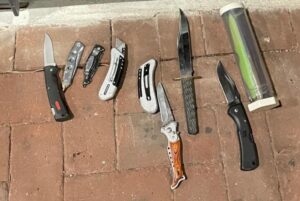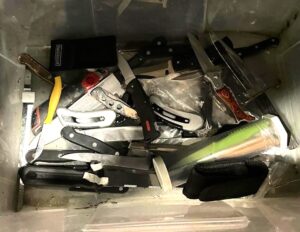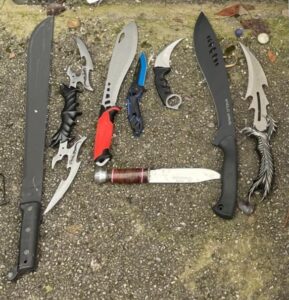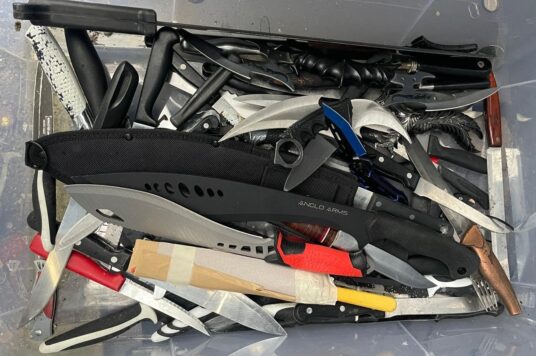Zombie knives handed in after St George’s Hospital installs amnesty bin in UK first
A patient has described the terrifying moment he was stabbed with a 15-inch blade while onlookers filmed on their phones – as the hospital where he was treated reveals almost 100 dangerous weapons have been surrendered on site.
The male from South London, who did not wish to be named, was recently admitted to St George’s Hospital in Tooting – where knife-related admissions have doubled – after being stabbed with a ‘Rambo’ knife.
The patient in his twenties, who suffered internal bleeding from a kidney injury, said:
“I didn’t even know I’d been stabbed at first. I felt a sharp pain, then it was hard to breathe and I could feel a wetness – that’s when I looked down and saw the knife sticking out of me. I was losing blood and was trying to get away from there – people were standing around filming on their phones.
“Coming into hospital is a blur, I don’t really remember it. I had an operation that saved my life, but it’s not just the wounds that need to heal – I’m still trying to process what happened and deal with the trauma.”
Last year, over 500 people with injuries from knives and other sharp objects were treated at St George’s emergency department – almost double that in 2022.

St George’s, with partners Wandsworth Council and Wandsworth Community Safety Partnership, is tackling knife crime by becoming the UK’s first hospital to install a secure bin to anonymously dispose of knives and other weapons.
When the bin – provided by knife crime charity Word 4 Weapons – was recently opened, a shocking cache of 79 weapons was discovered, including machetes, Zombie knives, knuckledusters, and other sharp objects that would otherwise have been out in the community.
Images of the discovery are now being released for the first time, as officials urge people to continue surrendering their weapons – to turn the tide on violent crime.
Cleo Kenington, consultant in emergency general surgery and major trauma at St George’s, said: “I’ve had to physically remove knives from patients on the operating table to stop them bleeding to death – it can take many teams of surgeons working on them, especially when the knife pierces multiple organs such as the heart and the guts. These patients are young, vulnerable and scared – they have their whole lives ahead of them and they often say ‘I don’t want to die’.

Cleo Kenington is a consultant in emergency general surgery and major trauma at St George’s
“I’ve seen more and more patients being admitted with stab wounds – once they arrive at St George’s we provide them with the best possible care and most survive, but tragically many patients die before they can reach hospital as their injuries are so severe.”
Jacqueline Totterdell, Group CEO of St George’s, Epsom and St Helier University Hospitals and Health Group (gesh), said: “Keeping staff and patients safe is our top priority – that’s why we’re working with partners to keep weapons out of our hospitals.
“I want to thank our excellent teams for providing vital care and compassion to those affected by knife crime.”
Minister for Policing, Fire and Crime Prevention, Dame Diana Johnson, said: “Tackling violence and making our streets safer is at the heart of this government’s Plan for Change and we cannot do this alone. I’ve seen first-hand how hospitals like St George’s can help – they are so often at the centre of tragic incidences of knife crime.
“Last month, we announced £9.4 million of funding for the London Violence Reduction Unit which will enable them to continue funding youth workers in major trauma centres across London to help young people impacted by knife crime.”

Commander Hayley Sewart, responsible for knife crime at the Metropolitan Police, said:
“Knife crime has a hugely damaging impact on victims, families and communities. The Met remains focussed on tackling knife crime and violence in London by carrying out proactive operations including high visibility patrols in hotspot areas, targeting violent offenders, and reducing the supply and access to weapons.
“Prevention is key. We have made a significant contribution to the rapid review of online knife sales as well as working closely with the London Violence Reduction Unit and the NHS to divert individuals and young people from knife crime, as we cannot tackle this alone.”
Rosena Allin-Khan, MP for Tooting, said: “Far too often, I have seen first hand the devastating impact of violent crime on our communities. Both as the local MP and an emergency doctor, I know just how important it is to use all available means to ensure that no more lives are senselessly lost to knife crime.
“This is an excellent initiative by St George’s and, through the number of weapons recovered, we are already seeing the progress that bins like these are making in taking even more knives off our streets.”
Graeme Henderson, Wandsworth Council’s Cabinet Member for Health, said: “At Wandsworth Council, we take the safety of residents and those visiting our borough seriously.
“These knife bins provide a safe and secure way for people to dispose of knives and we are proud to work with St George’s and Word 4 Weapons, demonstrating what a wide-reaching partnership we have in place to respond to violence and keep our streets safe.”

Sandra Campbell, Chief Executive of Words 4 Weapons, said: “These images may shock people but they are even more terrifying up close – and have the potential to end someone’s life or cause serious damage if they were still on the streets.”
Following the success of the amnesty bin, gesh will also install bins at St Helier Hospital and Epsom Hospital – which will be the first of its kind in Surrey.
Anyone carrying a knife is urged to dispose of it, after wrapping it in several layers of cardboard or paper and securing it with sticky tape to cover the blade.
While it is an offence to carry a knife in a public place, it is considered reasonable to carry it directly to a knife bin if it is wrapped in this way.
The Metropolitan Police urge anyone who is worried about their safety or the safety of others to contact the police on 101 or call 999 in an emergency. If you feel unable to talk to the police, you could contact the Crimestoppers charity anonymously on 0800 555 111 or visiting Fearless: Anonymous Reporting for a Safer Community | Crimestoppers. (You don’t have to give your name and your call will not be traced).


